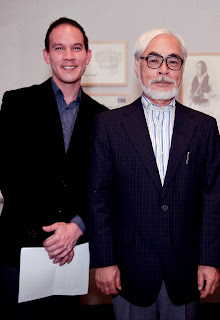Yomiuri column on Miyazaki, Horibuchi, Schodt and elections

.jpg)
Soft Power, Hard Truths / Miyazaki, Horibuchi and the virtues of change
Roland Kelts / Special to The Daily Yomiuri
When animation master Hayao Miyazaki observed that I was not wearing a necktie before our onstage conversation at the University of California, Berkeley late last month, he promptly unknotted his own necktie and stuffed the balled-up garment into the hands of his longtime producer, Toshio Suzuki. Then he smiled and nodded at me. He was ready.
Miyazaki was similarly casual throughout the evening, charming the 2,000-plus audience with a playful Cheshire smile, and deftly sidestepping questions that didn't appeal. I was prepared for worse; Miyazaki is notorious for terse rebuttals and curmudgeonly grunts. And while he did emit the occasional groan, he was also surprisingly candid.
"Disasters are things to be lived through," he said of the apocalyptic themes in his work. "They're not evil. They bring people closer together. In fact, when I go to the top of a skyscraper in Tokyo, I feel the hope that the seas will come a little closer. It would be wonderful if I could see the end of civilization in my lifetime, but it doesn't look like it's going to happen. So I have to use my imagination."
Viewers of Miyazaki's latest film, Ponyo, which recently had its U.S. release, see the mother of all flood tides engulf the movie's seaside town. Instead of destroying the town's buildings and inhabitants, however, Ponyo's disaster refreshes its characters' lives, cleansing them of hoary misperceptions and ossified ways.
Across the Pacific, Miyazaki's homeland was slouching toward a transformation of its own. With the general election set for Sunday, the 54-year rule of the Liberal Democratic Party is widely predicted to be nearing its end. "It takes a long time for the need for change to register in Japan," a colleague at Tokyo University told me. "But once it does, it strikes like lightning." [more here at 3am magazine]

.jpg)